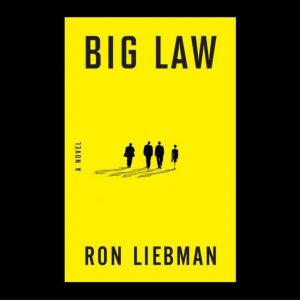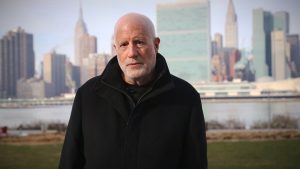From Biglaw Partner To Big Law Author: An Interview With Ron Liebman
What advice does he have to offer to both aspiring attorneys and authors?
 If you’re looking for something to read that’s not a motion for summary judgment or a trust indenture, allow me to recommend Big Law, the latest novel from attorney turned author Ron Liebman. It’s a fun and fast-paced read — I finished it in a day — and it contains insights about the world of large law firms that will make you laugh or cry, depending on your mood and circumstances.
If you’re looking for something to read that’s not a motion for summary judgment or a trust indenture, allow me to recommend Big Law, the latest novel from attorney turned author Ron Liebman. It’s a fun and fast-paced read — I finished it in a day — and it contains insights about the world of large law firms that will make you laugh or cry, depending on your mood and circumstances.
I recently caught up with Ron Liebman to ask about the book, his impressive career in both law and literature, and his advice for aspiring authors and attorneys. Here’s a (lightly edited and condensed) write-up of our conversation.
DL: Although you take some poetic license here and there, Big Law is in many ways an accurate depiction of life at a large law firm — which makes sense, given your familiarity with this setting. You’ve had a very interesting and wide-ranging career in the law. Can you give us an overview of your experience in the legal profession?

AI’s Impact On Law Firms Of Every Size

RL: After law school I clerked for a federal judge, then spent a year as an associate in a Baltimore law firm, then became an assistant U.S. attorney, where I was on the team that prosecuted Vice President Spiro Agnew and Maryland Governor Marvin Mandel. I then spent a short time in a Washington, D.C. boutique litigation law firm before becoming a partner at Patton Boggs (26 years), then spent eight months at Dewey & LeBoeuf before escaping. Dewey & LeBoeuf imploded four years later.
DL: The firm depicted in your novel, Dunn & Sullivan, is not a particularly fun place to work. But it’s also realistic, in terms of the long hours and internal politics. I suspect some readers will want to know: did you use any particular law firm — perhaps one of your former professional homes — as a model for D&S?
RL: No. Having spent years observing law firms, my own and those that were my co-counsel or opposing counsel, I created D&S from a little bit here, a little bit there. It’s a stew with a dash of fictional salt.
DL: Fair enough. Speaking for myself, I do see echoes of your two former firms in D&S. The financial shenanigans are Dewey-esque, while the idea of a law firm getting dragged into a mass-torts case occurring overseas and possibly tainted by corruption made me think of Patton Boggs and the Chevron/Ecuador mess. Any comment you can offer on that, and the role it might have played in the demise of Patton Boggs?
Sponsored

How Transactional Lawyers Can Better Serve (And Maintain) Their Clients

Law Firms Now Have A Choice In Their Document Comparison Software

Why Do AI And Legal Professionals Make The Perfect Partnership?


Law Firms Now Have A Choice In Their Document Comparison Software
RL: As I said, I used bits and pieces from here and there. I was long gone from Dewey when I — like everyone else — read the allegations about Dewey’s financial “behavior,” and gone from Patton Boggs before the Chevron debacle hit them. That horrible mess of a case hurt them badly. I still have great fondness for PB and was saddened to watch as the firm started sinking in a sea of red ink. Luckily for those who didn’t abandon ship, Squire Sanders threw them a lifeline.
DL: Some folks who work in Biglaw might find a large law firm to be a surprising setting for a gripping page-turner like your novel. How did you decide to situate your story in a big firm?
RL: First, thank you. I’m glad you enjoyed the book. Biglaw is a world I know, a wonderful world filled with brains, ambition, egos (some Trump-like massive), intrigue, and so on. I thought it was tailor-made for a novel. I was also interested in how during my years in Biglaw, it remained a profession but began adopting behavior patterns more often associated with the business world. As with so much of business, the bottom line took top priority.

Ron Liebman
DL: The world of Biglaw has definitely become more bottom-line oriented. Partner profits and associate salaries are high, but so are billable hours and stress, as Big Law makes clear. If a young law student at a top law school came to you for advice and asked whether she should go to a large law firm after graduation, what would you tell her?
Sponsored

AI’s Impact On Law Firms Of Every Size


Generative AI In Legal Work — What’s Fact And What’s Fiction?

RL: Great question. Biglaw will provide first-class training, whether you ultimately make partner or not; you will be working on very interesting cases, sometimes with cutting-edge legal issues; you’ll be in the company of some of the finest legal minds; and so on. But the pain — here cue the theme music from The Devil’s Advocate film — the pain is undeniable. There will be considerable stress. Much of your life as an associate won’t be your own because you’ll be at work with heavy doses of midnight oil, lost weekends and holidays. If you feel like you will be selling your soul to you know whom, don’t do it. Otherwise, sign up. It will make you a better lawyer.
DL: So Big Law is by no means your first book. You co-edited the legal treatise Testimonial Privileges; wrote three other novels (Grand Jury, Death by Rodrigo, and Jersey Law); and also authored a work of non-fiction, Shark Tales—True and Amazing Stories from America’s Lawyers (affiliate links). What’s the next project on your plate?
RL: I’m considering a sequel to Big Law. Without disclosing the new plot, I’m toying with a David-and-Goliath theme involving some, though not all, of Big Law’s characters.
DL: Your career, both as a lawyer and writer, is enviable. What advice would you give to lawyers who would also like to write creatively?
RL: Go for it, but keep your daytime job.
DL: Wise words. Congratulations again on Big Law, and thanks for taking the time to talk!
(Disclosure: I received a review copy of this book)
Big Law: A Novel [Amazon (affiliate link)]
Earlier: Standard Of Review: A Notable New Novel About Biglaw
 David Lat is the founder and managing editor of Above the Law and the author of Supreme Ambitions: A Novel. He previously worked as a federal prosecutor in Newark, New Jersey; a litigation associate at Wachtell, Lipton, Rosen & Katz; and a law clerk to Judge Diarmuid F. O’Scannlain of the U.S. Court of Appeals for the Ninth Circuit. You can connect with David on Twitter (@DavidLat), LinkedIn, and Facebook, and you can reach him by email at dlat@abovethelaw.com.
David Lat is the founder and managing editor of Above the Law and the author of Supreme Ambitions: A Novel. He previously worked as a federal prosecutor in Newark, New Jersey; a litigation associate at Wachtell, Lipton, Rosen & Katz; and a law clerk to Judge Diarmuid F. O’Scannlain of the U.S. Court of Appeals for the Ninth Circuit. You can connect with David on Twitter (@DavidLat), LinkedIn, and Facebook, and you can reach him by email at dlat@abovethelaw.com.







